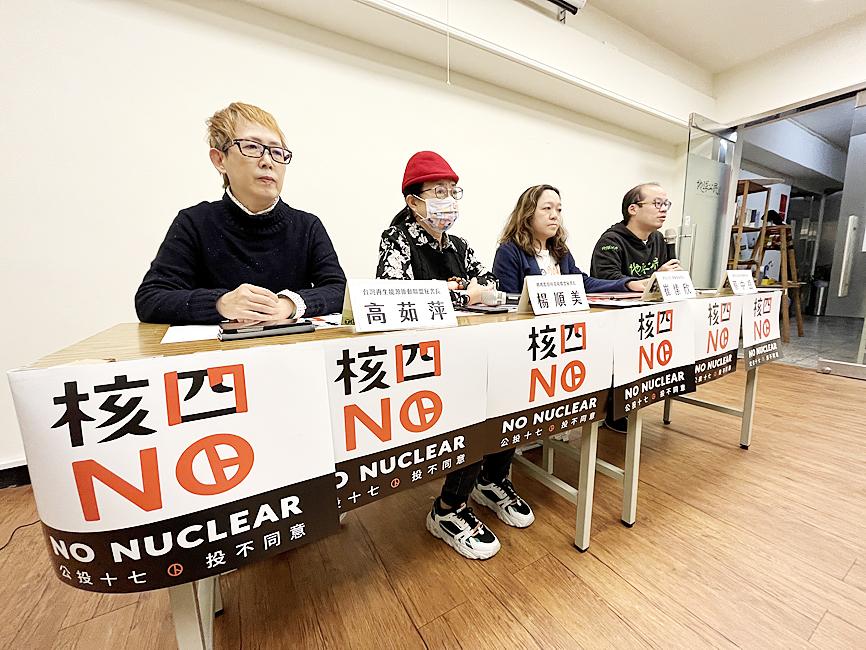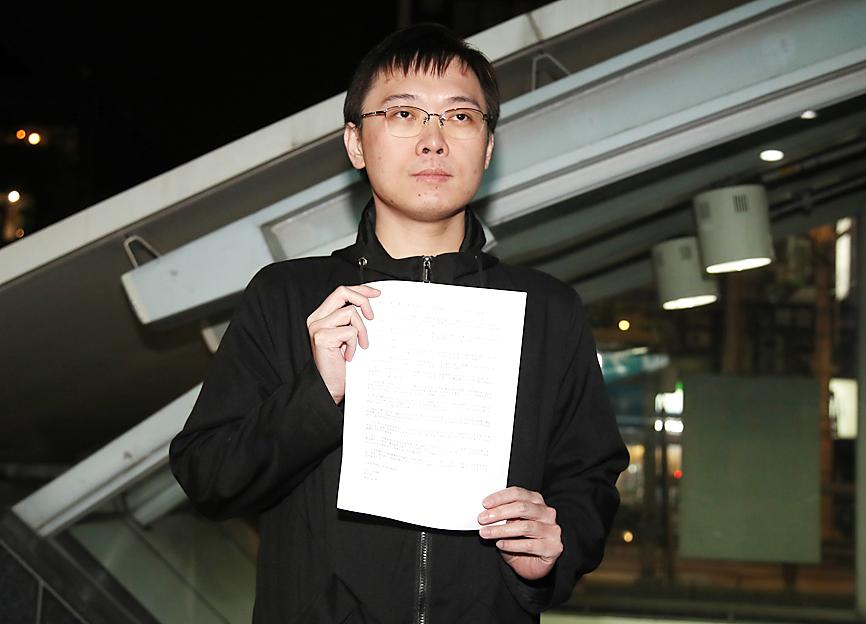A majority of voters yesterday rejected a proposal to restart construction on the mothballed Fourth Nuclear Power Plant in New Taipei City’s Gongliao District (貢寮), with 4,262,451 votes against and 3,804,755 in favor.
Initiated by nuclear power advocate Huang Shih-hsiu (黃士修), the referendum asked voters: “Do you agree that the Fourth Nuclear Power Plant should be activated for commercial operations?”
The plant was most recently mothballed in 2015 when Ma Ying-jeou (馬英九) of the Chinese Nationalist Party (KMT) was president, one year after former Democratic Progressive Party (DPP) chairman Lin I-hsiung (林義雄) staged a hunger strike against the plant’s construction.

Photo: CNA
The referendum has garnered the most “no” votes among the four referendums held yesterday, Citizen of the Earth, Taiwan deputy executive director Tsai Chung-yueh (蔡中岳) told a news conference in Taipei yesterday.
The result showed that voters are concerned about the plant’s location in an earthquake-prone area and nuclear waste disposal, he said.
While another referendum in 2018 indicated mayority support for nuclear power, yesterday’s vote showed that Taiwan would continue its efforts to become “a nuclear-free homeland,” Tsai said, thanking voters for lending support for energy transition.

Photo: CNA
“Finally, the Fourth Nuclear Power Plant [is] history,” Green Citizens’ Action Alliance secretary-general Tsuei Su-hsin (崔愫欣) said.
The plan to construct the plant goes back to the 1980s, when the nation was under martial law, she said, adding that the plant has been a symbol in the nation’s political struggles.
The government should start making plans to demolish the unfinished plant, and review its effect on the nation’s budget and how to use the site, Tsuei said.
Huang wrote on Facebook that he regretted that the referendum had failed.
The government would never tackle the nuclear waste issue, and burned fuel rods would probably be permanently stored in New Taipei City, Huang said, referring to storage sites at two other plants in Shihmen (石門) and Wanli (萬里) districts.
Without the Fourth Nuclear Power Plant, the government would burn more coal, leading to more air pollution in central and southern Taiwan, as well as more deaths, Huang added.
The nation’s transition to renewable energy sources is behind schedule, and Taiwan might face serious electricity shortages, he said.
The ruling and opposition parties should jointly consider extending the licenses of Wanli’s Guosheng Nuclear Power Plant and Pingtung County’s Ma-anshan Nuclear Power Plant, he said.
Alternatively, Taiwan could follow the global trend and treat nuclear power as “green” energy, Huang said, suggesting the construction of a small modular reactor at the site of the Fourth Nuclear Power Plant.
The Atomic Energy Council in 2017 approved Taiwan Power Co’s (Taipower) plan to decommission Shihmen’s Jinshan Nuclear Power Plant within 25 years.
Decommissioning of four units at the Guosheng and Ma-anshan plants would begin before 2025, the council said.
Another referendum in 2018 prompted the government to nullify Article 95-1 of the Electricity Act (電業法), which stipulated that all nuclear power plants should go offline by 2025.
However, the government has not made any attempts to change the timetable for the decommissioning of nuclear reactors since the 2018 vote.
Last year, about 12.7 percent of the nation’s electricity was generated by nuclear plants, 40.8 percent by gas-fired units, 36.4 percent by coal-fired units, 5.8 percent by renewable sources and the rest by mixed sources, data on Taipower’s Web site shows.

The Mainland Affairs Council (MAC) today condemned the Chinese Communist Party (CCP) after the Czech officials confirmed that Chinese agents had surveilled Vice President Hsiao Bi-khim (蕭美琴) during her visit to Prague in March last year. Czech Military Intelligence director Petr Bartovsky yesterday said that Chinese operatives had attempted to create the conditions to carry out a demonstrative incident involving Hsiao, going as far as to plan a collision with her car. Hsiao was vice president-elect at the time. The MAC said that it has requested an explanation and demanded a public apology from Beijing. The CCP has repeatedly ignored the desires

Many Chinese spouses required to submit proof of having renounced their Chinese household registration have either completed the process or provided affidavits ahead of the June 30 deadline, the Mainland Affairs Council (MAC) said on Thursday. Of the 12,146 people required to submit the proof, 5,534 had done so as of Wednesday, MAC deputy head and spokesperson Liang Wen-chieh (梁文傑) said. Another 2,572 people who met conditions for exemption or deferral from submitting proof of deregistration — such as those with serious illnesses or injuries — have submitted affidavits instead, he said. “As long as individuals are willing to cooperate with the legal

The Ma-anshan Nuclear Power Plant’s license has expired and it cannot simply be restarted, the Executive Yuan said today, ahead of national debates on the nuclear power referendum. The No. 2 reactor at the Ma-anshan Nuclear Power Plant in Pingtung County was disconnected from the nation’s power grid and completely shut down on May 17, the day its license expired. The government would prioritize people’s safety and conduct necessary evaluations and checks if there is a need to extend the service life of the reactor, Executive Yuan spokeswoman Michelle Lee (李慧芝) told a news conference. Lee said that the referendum would read: “Do

Taiwan's Vice President Hsiao Bi-khim (蕭美琴) said Saturday that she would not be intimidated by the Chinese Communist Party (CCP), following reports that Chinese agents planned to ram her car during a visit to the Czech Republic last year. "I had a great visit to Prague & thank the Czech authorities for their hospitality & ensuring my safety," Hsiao said on social media platform X. "The CCP's unlawful activities will NOT intimidate me from voicing Taiwan's interests in the international community," she wrote. Hsiao visited the Czech Republic on March 18 last year as vice president-elect and met with Czech Senate leadership, including